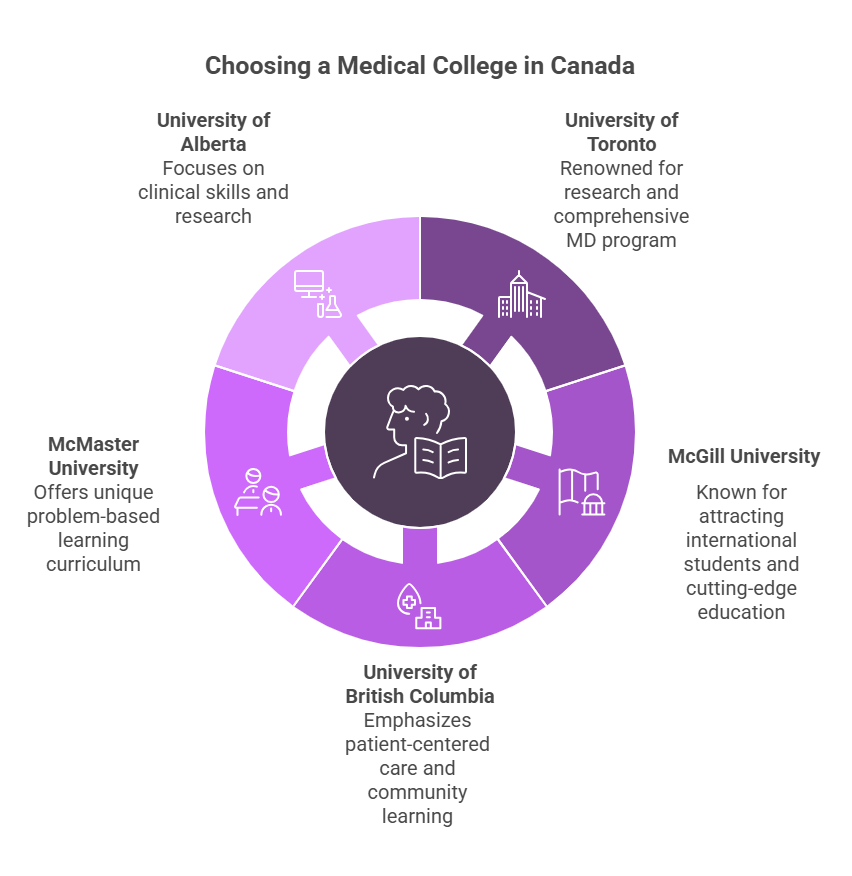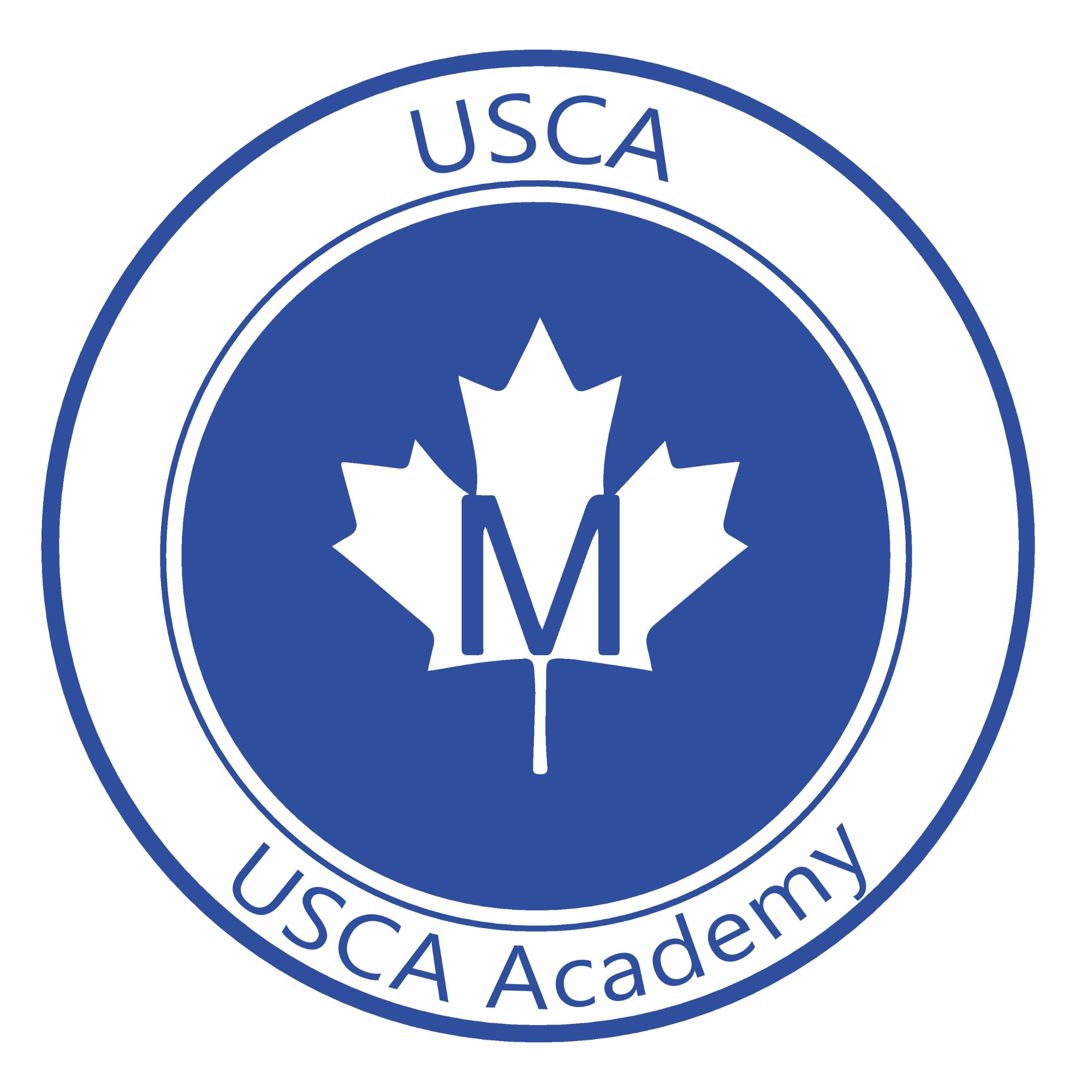International students consider Canada their first option because of its excellent educational opportunities. Medical studies in Canada for international students follow a standardised, globally recognised curriculum. Studying medicine in Canada offers international students a unique opportunity to excel in healthcare. Renowned for its world-class institutions, diverse communities, and welcoming society, Canada provides an ideal environment for medical training.
This comprehensive guide contains all the information needed by students to study medicine in Canada, starting from costs and scholarships to requirements and available programs. The following paragraphs explain these points in detail. What steps do I need to take to study in Canada? Students should start their application process by selecting a Designated Learning Institution, receiving an acceptance letter, admission then requesting a study permit before achieving their Canadian study dream.
Why Choose Medical Studies in Canada for International Students?
Canada is well known for its top-notch healthcare system, highly qualified medical staff, and innovative research. Medical studies in Canada for International students provide numerous benefits. It is the perfect place for students from across the world to learn and develop because of its first-rate facilities, friendly, and multicultural environment.A university prep course is designed to help students develop the academic skills, knowledge, and confidence necessary to succeed in university-level studies.
Canada’s emphasis on research and innovation is one of the top reasons so many people opt to study medicine there. Canadian universities are pioneers in medical research and give students many chances to participate in ground-breaking projects. Furthermore, Canada has one of the greatest healthcare systems in the world, which gives students a chance to experience the real world while they are learning.
Why Canada?
- Ranked among the top 10 healthcare systems globally (WHO, 2023).
- Safest country for international students (Global Peace Index, 2023).
- Affordable living costs compared to the US/UK.
Types of Medical Programs in Canada for International Students
There is a wide range of medical programs in Canada for International students. There are alternatives to suit your professional goals, whether you want to enroll in an undergraduate or graduate medical degree. Here, we’ll examine the many kinds of medical education that Canada offers.
Undergraduate Medical Programs
In Canada, the Doctor of Medicine (MD) program is usually used to offer undergraduate medical education. Before applying to these programs, students often need to have a bachelor’s degree. Biology, chemistry, and other sciences should be the main focus of this degree since they are essential to medical education. If you’re seeking an international school in Toronto, the city offers a diverse selection of institutions catering to various curricula and student needs.
The first two years of an MD program, which often lasts 4 years, are devoted to theoretical study in subjects including anatomy, pharmacology, and pathology. The latter years are devoted to clinical training, when students work in clinics and hospitals to obtain practical experience with actual patients.
Postgraduate Medical Courses in Canada for International Students
Postgraduate medical courses in Canada for International students are available for those who already have an MD or equivalent degree. Students can specialise in fields such as cardiology, psychiatry, surgery, and more with these programs. Depending on the speciality, postgraduate medical education in Canada usually lasts 2-7 years and is quite competitive.
In Canada, postgraduate programs frequently include research, clinical rotations, and lectures in the classroom. These programs can provide amazing chances for International students to further their medical careers with globally recognised training.
Specialised Medical Fields for medical studies in Canada for international students
For students interested in certain fields of medicine, such as dentistry, veterinary medicine, or public health, Canada also provides specialised medical programs. These programs are frequently offered by specialist institutes or as part of the curriculum at medical schools. Although specialised professions may need extra years of coursework and clinical experience, they provide graduates with special job prospects.
Top Medical Colleges in Canada for International Students

Here are a few top colleges to study medicine in Canada for International students. Each has special advantages, and which one is best for you will rely on your objectives, hobbies, and financial situation.
University of Toronto
This one is Canada’s most prominent medical school. The institution has an internationally renowned MD program and is well-known for its wealth of research possibilities. The curriculum prepares students for careers as physicians, researchers, and educators by emphasising medical science, clinical practice, and research.
McGill University
This university is located in Montreal and is well-known for its top-notch medical school, which provides cutting-edge medical education programs. It is known for drawing in International students from all around the world.
University of British Columbia
If you are looking for the best college to study medicine in Canada for International students, this is another well-liked one. Their MD program is renowned for emphasising patient-centred treatment and community-based learning.
McMaster University
This university has a distinctive medical curriculum that emphasises self-directed learning and small-group discussions through problem-based learning (PBL). This approach equips students to handle medical problems in the actual world.
University of Alberta
A globally renowned MD program is available at this university. The institution is renowned for emphasising clinical skills and research, which makes it a great option for individuals who want to work in medicine.
Eligibility & Requirements to Study Medicine in Canada for International Students
can be competitive, but understanding what you need to succeed is important. How can I study in Canada? Begin by applying to a Designated Learning Institution, obtaining an acceptance letter, and applying for a study permit to make your dream of studying in Canada a reality. Fulfil these requirements to get approved:
Academic Criteria
Applicants typically need a bachelor’s degree in sciences like biology or chemistry to qualify for Canadian medical schools.Since biology, chemistry, and physics are essential for medical studies, these disciplines should be included in this degree. Certain courses or a particular GPA may also be prerequisites for admission to some colleges.
Language Proficiency (IELTS/TOEFL)
International students must show that they are proficient in one of the two languages because the majority of Canadian medical schools offer their courses in either English or French. Typically, this is accomplished by completing standardized examinations like the TOEFL or IELTS. Universities have different minimum requirements; however, a high score will support your application.
English Language Test Requirements (General Range)
| Test | Minimum Score Required | Accepted By Most Universities? |
| IELTS | 6.5-7.0 overall | Yes |
| TOEFL iBT | 90-100 overall | Yes |
| Duolingo (some universities) | 115-120 | Limited |
Check individual university policies for Duolingo acceptance.
MCAT & Other Entrance Exams
The majority of Canadian medical colleges demand that International applicants submit their MCAT results. An important test for applicants to Canadian medical programs is The MCAT assesses critical thinking, biology, chemistry, and psychology (Source: Medical Council of Canada (MCC)). Make sure to review the admissions policies of each school as they may have different requirements.
Cost of Studying Medicine in Canada for International Students
The cost of studying medicine in Canada for International students varies depending on the university you choose, but it is important to understand the financial commitment before you apply.
Tuition Fees by University
| University | Tuition Fees (Per Year) | Courses Offered | Location | Scholarships Available |
| University of Toronto | CAD 50,000 | MD Program, Postgraduate Courses | Toronto, Ontario | Merit-based scholarships available |
| McGill University | CAD 45,000 | MD Program, Postgraduate Courses | Montreal, Quebec | Need and merit-based scholarships |
| University of British Columbia (UBC) | CAD 32,000–40,000 | MD Program, Specialized Medical Programs | Vancouver, British Columbia | Scholarships based on academic excellence |
| McMaster University | CAD 40,000 | MD Program | Hamilton, Ontario | Scholarships for international students |
| University of Alberta | CAD 38,000 | MD Program, Postgraduate Courses | Edmonton, Alberta | University-specific scholarships available |
Living Expenses
Students also need to budget for Living costs range from CAD 10,000–20,000/year (Source: Statistics Canada, 2023), which, depending on the city and lifestyle, can vary from CAD 10,000 to CAD 20,000 per year. The cost of living is often greater in major cities like Toronto or Vancouver than in smaller ones.
Affordable Medical Schools
Although certain Canadian medical programs might be costly, there are other less priced alternatives. Comparatively speaking, tuition costs at universities like the University of Alberta and the University of Calgary are cheaper than those at universities in bigger cities.
Scholarships for International Medical Students in Canada
Although studying in Canada might be costly, international students can apply for several scholarships. Here are some options:
Fully Funded Medical Scholarships in Canada
Several institutions offer fully funded medical scholarships in Canada for international students. They may be used to pay for living expenses as well as tuition. The Canadian Commonwealth Scholarship Program and the Vanier Canada Graduate Scholarships are two well-known scholarship programs.
University-Specific Scholarships
Numerous Canadian colleges provide scholarships designed especially for students from other countries. The usual criteria for awarding these scholarships are financial need and academic achievement. For individuals in need of financial assistance, McGill University provides the International Student Bursary Program.
Government Aid and External Grants
Additionally, students can qualify for external grants and government assistance. These funds can assist with living expenses and tuition costs.
Step-by-Step Guide to Applying for Medical Programs in Canada
It might take a long time to apply to Canadian medical schools. To assist you in navigating the application process, here is how to get a scholarship to study medicine in Canada:
Application Process
The initial step is to look into medical programs that fit your professional objectives. To submit your application, you must first create an account on the portal that each university provides.
Required Documents
Common documents required for admission include:
- Academic transcripts
- Proof of language proficiency (IELTS/TOEFL scores)
- MCAT scores
- Letters of recommendation
- Personal statement or essay
Important Deadlines
Since application deadlines differ from school to school, it’s important to stay on top of them. Make sure to start early because the application deadlines are often several months prior to the commencement of the program.
Career Opportunities After Medical Studies in Canada
You can apply for a license to practice medicine in Canada once you have finished your medical education there. Medical graduates from Canada are in great demand and can find employment in clinics, hospitals, and research facilities. Because of Canada’s high need for medical experts, many international students who finish their courses there decide to remain and work there.
Conclusion
Medical education in Canada for International students is a great opportunity to build a strong future in healthcare. It has become a dream destination for those who want to study medicine. Students benefit from top-notch instruction, practical experience, and exposure to state-of-the-art medical research. Scholarships and financial assistance are available to help you alleviate the financial load.
Frequently asked Questions About Medical Education in Canada for International Students
1. Can I work while studying medicine in Canada?
Yes, international students can work part-time while studying in Canada. However, the number of hours is limited during the academic year.
2. Which medical course is best in Canada?
The best course depends on your career goals. Most students pursue the MD program, but there are also postgraduate specialities like surgery and cardiology.
3. Can International students get scholarships to study medicine in Canada?
Yes, many Canadian universities offer scholarships specifically for International students. Additionally, there are government-funded scholarships like the Vanier Canada Graduate Scholarships.
4. Is it difficult to study medicine in Canada?
Yes, medical studies are challenging everywhere. However, with dedication and proper preparation, you can succeed in Canada’s rigorous medical programs.
5. Is Canada medical exam easy?
The medical exams in Canada are tough, but they are designed to ensure that only the best-trained individuals can practice medicine.









